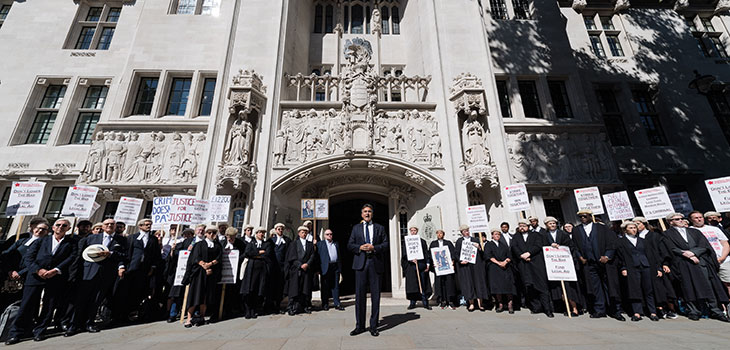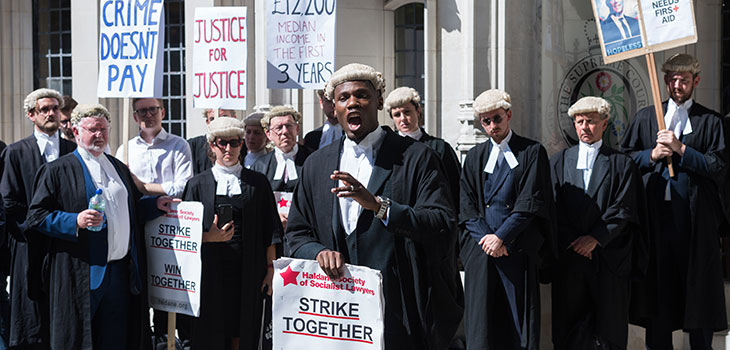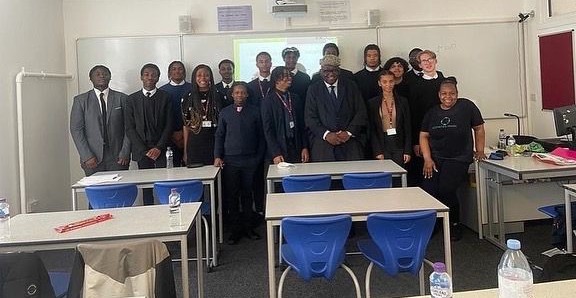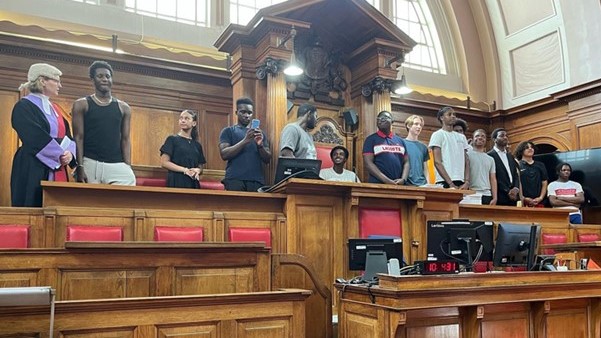*/

Criminal barristers in England and Wales are on strike and with good reason. After years of visible decline and erosion through a deliberate lack of investment, the criminal justice system is literally teetering on collapse. After COVID, the backlog of cases has ballooned to over 60,000 with many cases not being listed until 2023 and beyond.
The strike has exposed the exodus of thousands of young and established barristers who simply cannot continue in the profession they love. With rising inflation and no matching increase in legal aid fees for years, the figures just don’t add up for those who cannot even envision buying a home or starting families (the obvious examples). This comes after many are already in debt after funding the Bar course, the cost varying between £15,000 and £19,000.
It’s fact that most of those who will be affected by this will come from the ‘non-traditional’ backgrounds, like me, who chose this once illustrious profession as their dream career; not to become wealthy but to be part of a justice system that is admired and copied around the globe.

Pictured top and above: Criminal barristers rally outside the Supreme Court on 11 July (pictured top with Criminal Bar Association Chair, Jo Sidhu QC, centre). Pictured above: young criminal barristers speak powerfully about the reason for CBA action and the realities of working in the criminal justice system today © Shutterstock
It recently dawned on me that this is more than just a strike about fees; it is about those young people who aspire to enter a profession which was once predominantly White, male and elitist. We really don’t want to extinguish the hopes of those coming from different backgrounds, race, disabilities and genders who are talented and in demand to ensure that justice is done and seen to be done in our courtrooms up and down the country.
So, on the hottest day in the United Kingdom’s weather records (actually 40 degrees of scorching heat) I stood in a lightweight charcoal grey suit with shirt and tie eagerly awaiting the arrival of a group of students at Inner London Crown Court. I first met this mixed cohort of 16-17 year olds a few weeks earlier at St Thomas the Apostle College in Peckham, South East London, as part of the Elevated Aspirations programme. During my one-hour session, I was impressed by their enthusiasm and attentiveness to my presentation on the realities of the criminal justice system and the importance of pursuing excellence and self-leadership at this stage of their journey.
The highlight of the session was when they asked to pose for photos with me wearing my wig and gown, the ‘uniform’ of a barrister (pictured below). One young man from the group expressed a real interest in the law and becoming a lawyer. The excitement was tangible when I announced to the whole group that I would use my best endeavours to arrange a visit to a court to meet real judges and to observe live cases in session.

© Elevated Aspirations
True to my word, and after some emails between me, the Resident Judge and a sister Judge at Inner London, the day arrived. As the students were ushered into Court One and took their seats in counsel’s row there was an air of anticipation and nervousness. The sound of the gavel startled them as the court clerk bellowed, ‘All rise.’ The Resident Judge and Recorder of Southwark, Her Honour Judge Karu entered in full court dress accompanied by Her Honour Judge Newbery. I sat and observed with interest as the students asked questions and listened to the judges’ every word before being offered the opportunity to have a birds-eye view of the courtroom from the bench (pictured below).
They were particularly excited when they were permitted to sit in the red leather judge’s chair. I could see some of them imagining themselves in that role, and why not?
Brenda, the court clerk was instrumental in organising the rest of their morning which was spent in various courtrooms watching live trials and sentence hearings and being lucky enough to ask more questions of the judges hearing these cases.
By the end of the session, I could sense that some of the group were walking just that bit taller. They had a better understanding of what happens in criminal courts and the important and often difficult task of being an advocate for the accused. Some caught the insatiable appetite to aspire to don the wig and gown.
So, it was back into Court One just before the lunch adjournment for the closing remarks by Judge Newbery and the encouragement to students not to be put off by the difficult and challenging entry into the profession and its current (but I believe temporary) demise.

© Elevated Aspirations
The criminal justice system demands proper investment in its court centres and all the important branches that make it what it is. The current action is more than just another strike. It’s about preserving a criminal justice system that ensures fair and proper representation of those accused of criminal offences. It could be us, or anyone we know, despite protestation (or misguided sentiment) that it affects people of a certain class, race or disposition and never me, or the trope that all barristers are ‘fat cats’.
The Bar of England and Wales, which I have been fortunate to have been a member of for 30 years, must be reflective of our communities and society at large. It should spawn a more diverse pool of judges; drawn from the very able of all backgrounds, regardless of class, race, disability and gender. So, when I see my colleagues refusing to attend court and take on new instructions as part of the action to get proper and fair remuneration for current and future cases, I understand both personally, and through my engagement with the students of St Thomas the Apostle, why it’s more than just a strike.
My work and mentorship of young people with an interest in the legal profession shall continue regardless; the students walking just that bit taller left me in no doubt of the importance of the strike.
After all, if you build it, they will come.
This article was first published on www.counselmagazine.co.uk on 15 August 2022. It was updated on 1 September for inclusion in the September issue. The Criminal Bar’s weeks of action, combined with no new instructions (including no returns), came into effect on an indefinite basis from Monday 5 September.

Criminal barristers in England and Wales are on strike and with good reason. After years of visible decline and erosion through a deliberate lack of investment, the criminal justice system is literally teetering on collapse. After COVID, the backlog of cases has ballooned to over 60,000 with many cases not being listed until 2023 and beyond.
The strike has exposed the exodus of thousands of young and established barristers who simply cannot continue in the profession they love. With rising inflation and no matching increase in legal aid fees for years, the figures just don’t add up for those who cannot even envision buying a home or starting families (the obvious examples). This comes after many are already in debt after funding the Bar course, the cost varying between £15,000 and £19,000.
It’s fact that most of those who will be affected by this will come from the ‘non-traditional’ backgrounds, like me, who chose this once illustrious profession as their dream career; not to become wealthy but to be part of a justice system that is admired and copied around the globe.

Pictured top and above: Criminal barristers rally outside the Supreme Court on 11 July (pictured top with Criminal Bar Association Chair, Jo Sidhu QC, centre). Pictured above: young criminal barristers speak powerfully about the reason for CBA action and the realities of working in the criminal justice system today © Shutterstock
It recently dawned on me that this is more than just a strike about fees; it is about those young people who aspire to enter a profession which was once predominantly White, male and elitist. We really don’t want to extinguish the hopes of those coming from different backgrounds, race, disabilities and genders who are talented and in demand to ensure that justice is done and seen to be done in our courtrooms up and down the country.
So, on the hottest day in the United Kingdom’s weather records (actually 40 degrees of scorching heat) I stood in a lightweight charcoal grey suit with shirt and tie eagerly awaiting the arrival of a group of students at Inner London Crown Court. I first met this mixed cohort of 16-17 year olds a few weeks earlier at St Thomas the Apostle College in Peckham, South East London, as part of the Elevated Aspirations programme. During my one-hour session, I was impressed by their enthusiasm and attentiveness to my presentation on the realities of the criminal justice system and the importance of pursuing excellence and self-leadership at this stage of their journey.
The highlight of the session was when they asked to pose for photos with me wearing my wig and gown, the ‘uniform’ of a barrister (pictured below). One young man from the group expressed a real interest in the law and becoming a lawyer. The excitement was tangible when I announced to the whole group that I would use my best endeavours to arrange a visit to a court to meet real judges and to observe live cases in session.

© Elevated Aspirations
True to my word, and after some emails between me, the Resident Judge and a sister Judge at Inner London, the day arrived. As the students were ushered into Court One and took their seats in counsel’s row there was an air of anticipation and nervousness. The sound of the gavel startled them as the court clerk bellowed, ‘All rise.’ The Resident Judge and Recorder of Southwark, Her Honour Judge Karu entered in full court dress accompanied by Her Honour Judge Newbery. I sat and observed with interest as the students asked questions and listened to the judges’ every word before being offered the opportunity to have a birds-eye view of the courtroom from the bench (pictured below).
They were particularly excited when they were permitted to sit in the red leather judge’s chair. I could see some of them imagining themselves in that role, and why not?
Brenda, the court clerk was instrumental in organising the rest of their morning which was spent in various courtrooms watching live trials and sentence hearings and being lucky enough to ask more questions of the judges hearing these cases.
By the end of the session, I could sense that some of the group were walking just that bit taller. They had a better understanding of what happens in criminal courts and the important and often difficult task of being an advocate for the accused. Some caught the insatiable appetite to aspire to don the wig and gown.
So, it was back into Court One just before the lunch adjournment for the closing remarks by Judge Newbery and the encouragement to students not to be put off by the difficult and challenging entry into the profession and its current (but I believe temporary) demise.

© Elevated Aspirations
The criminal justice system demands proper investment in its court centres and all the important branches that make it what it is. The current action is more than just another strike. It’s about preserving a criminal justice system that ensures fair and proper representation of those accused of criminal offences. It could be us, or anyone we know, despite protestation (or misguided sentiment) that it affects people of a certain class, race or disposition and never me, or the trope that all barristers are ‘fat cats’.
The Bar of England and Wales, which I have been fortunate to have been a member of for 30 years, must be reflective of our communities and society at large. It should spawn a more diverse pool of judges; drawn from the very able of all backgrounds, regardless of class, race, disability and gender. So, when I see my colleagues refusing to attend court and take on new instructions as part of the action to get proper and fair remuneration for current and future cases, I understand both personally, and through my engagement with the students of St Thomas the Apostle, why it’s more than just a strike.
My work and mentorship of young people with an interest in the legal profession shall continue regardless; the students walking just that bit taller left me in no doubt of the importance of the strike.
After all, if you build it, they will come.
This article was first published on www.counselmagazine.co.uk on 15 August 2022. It was updated on 1 September for inclusion in the September issue. The Criminal Bar’s weeks of action, combined with no new instructions (including no returns), came into effect on an indefinite basis from Monday 5 September.


The Chair of the Bar sets out how the new government can restore the justice system
In the first of a new series, Louise Crush of Westgate Wealth considers the fundamental need for financial protection
Unlocking your aged debt to fund your tax in one easy step. By Philip N Bristow
Possibly, but many barristers are glad he did…
Mental health charity Mind BWW has received a £500 donation from drug, alcohol and DNA testing laboratory, AlphaBiolabs as part of its Giving Back campaign
The Institute of Neurotechnology & Law is thrilled to announce its inaugural essay competition
How to navigate open source evidence in an era of deepfakes. By Professor Yvonne McDermott Rees and Professor Alexa Koenig
Brie Stevens-Hoare KC and Lyndsey de Mestre KC take a look at the difficulties women encounter during the menopause, and offer some practical tips for individuals and chambers to make things easier
Sir Geoffrey Vos, Master of the Rolls and Head of Civil Justice since January 2021, is well known for his passion for access to justice and all things digital. Perhaps less widely known is the driven personality and wanderlust that lies behind this, as Anthony Inglese CB discovers
The Chair of the Bar sets out how the new government can restore the justice system
No-one should have to live in sub-standard accommodation, says Antony Hodari Solicitors. We are tackling the problem of bad housing with a two-pronged approach and act on behalf of tenants in both the civil and criminal courts